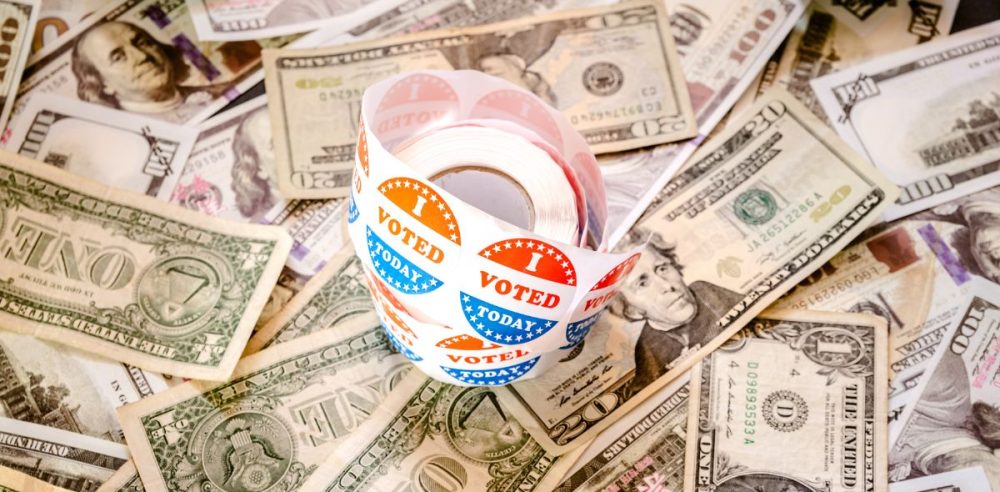Campaign finance reform is the biggest leftwing political issue that no one is currently discussing.
The issue skyrocketed in the late 1990s and reached its peak in 2000 and 2001, with around 35,000 usages of the term “campaign finance reform” during that period, according to the research database LexisNexis. Then, something curious happened: usages of “campaign finance reform” in the news, press releases, laws, legal analysis, academic articles, and other sources plummeted with every presidential election and most of the midterms since 2008.
This comes as Democrats have broken fundraising records for the last several election cycles. Vice President Kamala Harris recently surpassed $1 billion in fundraising while also shattering the one-month and one-day records for fundraising. In 2020, campaign finance watchdog Open Secrets said Biden was the first candidate to break the billion-dollar mark from donors, although some reports dispute this.
Former Secretary of State Hillary Clinton reportedly raised twice as much money as challenger Donald Trump; President Barack Obama and GOP challenger Mitt Romney roughly tied in fundraising. Obama received far more donations than then-Arizona Sen. John McCain.
This contrasted with the messages Democrat presidential candidates had been sending for years.
As recently as 2016, Clinton ran on “putting forward a plan for aggressive campaign finance reform.”
In his 2010 State of the Union Address, Obama warned that without campaign finance reform, corporate cash and influence would overrun America’s political system.
In 2000, The New York Times was running headlines like “With a Convert’s Passion, Gore Pledges Campaign Finance Reform,” about Vice President Al Gore as it reported that the presidential contender adopted the issue as a central campaign theme as a means to court disaffected independents who were initially attracted to McCain on that issue.
McCain would go on to introduce the eponymous campaign finance reform bill, commonly known as McCain–Feingold Act (2002) with Democrat Senator Russ Feingold of Wisconsin. The bill was intended to regulate the financing of political campaigns by reducing the influence of certain types of donations and limiting the use of issue advocacy ads close to elections. The law was immediately challenged and was partially struck down by the U.S. Supreme Court in Citizens United vs. FEC (2010).
Donations from corporate networks had been an issue for leftwing candidates for much of the latter half of the 20th century. Historically, Democrats lacked a consistent and sizeable corporate donor base. In contrast, Republicans received large donations from corporate networks, while Democrats depended on labor unions, plaintiff’s attorneys, and celebrities.
Federal law prohibits corporations and labor unions from donating directly to candidates. However, these organizations frequently get around these restrictions by having their networks of leadership and political action committees make donations instead of the organization doing it directly.
Flash forward to 2024, and campaign finance reform is not listed as a priority on the Biden-Harris Administration website. Harris’s campaign page lists several dozen planks, but none reference campaign finance reform.
If you google either Biden or Harris’s name and “campaign finance reform,” you get the same result: stories about whether Harris could use Biden’s campaign dollars when she assumed his place at the top of the presidential ticket this summer.
The Dallas Express previously reported that the network of pharmaceutical giant Pfizer had made major donations to Harris, the National Republican Senatorial Committee, and a variety of left-wing PACs. Although relatively smaller, some significant contributions were also made to the Trump campaign.
LexisNexis now records a paltry number of discussions of campaign finance reform. There have been only around 2,000 usages of the phrase so far this year, and the trend has continued its dive even as Election Day draws near.
Some figures have noticed and responded to this trend. In a stroke of coincidence, while The Dallas Express produced this story, author and political pundit Ann Coulter took to her podcast. She criticized the left for dropping this issue as their presidential candidates have become more adept fundraisers.
This comes as DX reported that “border security” has never been discussed more, and “abortion” is plummeting after a historic peak in the lead-up to Roe v Wade (1973) being overturned in 2022.


